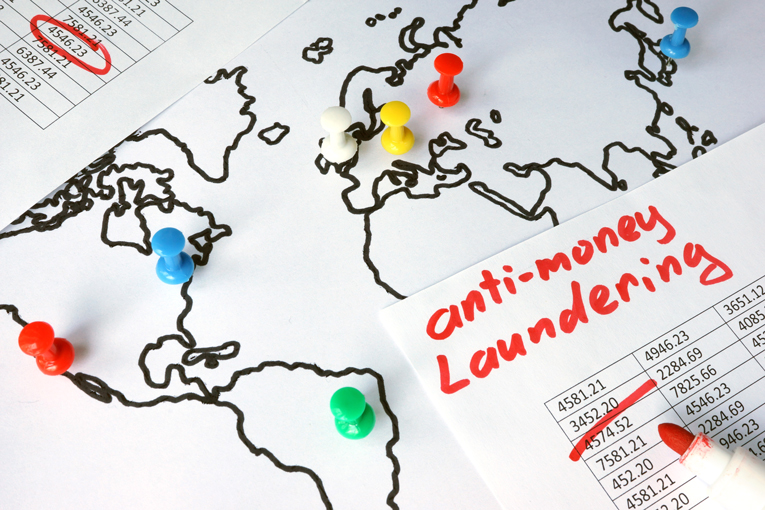Anti-Money Laundering (AML) Guidance

What is Money Laundering?
To hide their illegally obtained money, criminals and criminal organisations take part in a practice known as money laundering.
This process can involve many stages and vary in complexity, but the process is always essentially the same. Illegal or “dirty” money is passed through a complex set of transfers between bank accounts and various transactions to generate a fake paper trail to account for this money.
This fake paper trail is then used to hide the money’s origin by providing a supposedly legitimate account of its origins. This enables criminals to receive illegitimate funds without raising the suspicion of authorities.

The Impact of Money Laundering
Money laundering has been widespread for decades. It goes hand-in-hand with organised criminal activity as a necessary procedure that makes illegally obtained money legitimately viable.
According to the UNODC (United Nations Office on Drugs and Crime), around 2% – 5% of the world’s GDP is laundered. That amounts to approximately $800 billion – $2 trillion.
It is estimated that money laundering costs £255 per year for every household in the UK.
Anti-Money Laundering Efforts
Part of the problem with combating money laundering is that by its nature it is difficult for authorities to learn how widespread the practice is. It is difficult to obtain precise statistics on the issue, and so any actions planned and taken against it are based on very rough numbers.
Despite this, however, there have been many attempts to curb money laundering over the years. Some of these have been more successful than others and have been altered and replaced to suit the global marketplace’s changing nature.
Money Laundering and Terrorism
One significant change in attitudes towards policymaking that began around the turn of the twenty-first century is the perceived connection between money laundering and terrorism.
In the late twentieth century, anti-money laundering policies had developed alongside the War on Drugs. This has shifted over the past two decades to a focus on the War on Terror. Efforts to combat money laundering have necessarily overlapped with those to fight terrorism.
Anti-Money Laundering Legislation
A widespread and multifaceted crime as money laundering requires a diverse approach in terms of the policies used to combat it. Here are some of the most significant acts passed through Parliament over the past twenty years that are the cornerstone of the modern response to money laundering and terrorist funding:
2) Anti-terrorism, Crime and Security Act 2001
4) Serious Organised Crime and Police Act 2005
5) Sanctions and Anti-Money Laundering Act 2018
Differences in UK Law to Other Countries
As a member of the intergovernmental FATF (Financial Action Task Force), the UK must meet the minimum standards set out by this global body. Although the UK left the EU on January 31st, 2020, it is also necessary to meet the criteria laid out by EU regulations.
There are some significant differences in approach in the UK compared to other countries such as the United States.
There are no limits to the amount of money in the UK that can be considered a money laundering offence.
In contrast, the US has a limit on the amount of money that can be included in a transaction before a money laundering report can be made. This is typically around $10,000. However, every transaction over that threshold must be submitted for money laundering checks.
Also, in the UK, money laundering is not restricted to the illegal acquisition of money, but any asset which is deemed as providing a benefit to the person or organisation involved. As such, there need not be an exchange of currency, and there need not be any original purpose or design to launder wealth for a crime to be committed.
These differences compared to other authorities worldwide, are due to the difference in the definition of the term money laundering, as seen by the UK government.
It has an extensive range of what can be classed as money laundering. In summary, any handling of any proceeds obtained through illegal means is considered a money-laundering crime in the UK.
The maximum penalty for anyone charged with a money laundering offence is fourteen years imprisonment.
Professional Guidance – AML Regulations
Different sectors have different advice on how best to combat money laundering. Due to the differences in both the threat of money laundering and the approaches to fighting it, specific sectors have their versions of AML (anti-money laundering) guidance.
All guidance is based on current legislation – most notably the Sanctions and Anti-Money Laundering Act 2018.
Two central bodies that are responsible for setting and reviewing anti-money laundering guidance and regulations are the FCA (Financial Conduct Authority), and HMRC. HMRC ultimately oversees the FCA.
The Financial Conduct Authority (FCA)
Within the FCA is the OPBAS (Office for Professional Body Anti-Money Laundering Supervision). This body is responsible for helping to improve standards by working with all 22 AML supervisors in the legal and accountancy sectors to improve their regulations and ensure that they are best suited to combating money laundering.
The FCA (Financial Conduct Authority) published the “Anti-money Laundering Annual Report 2018/2019” in 2019. This revealed the ongoing money-laundering investigations and that the issue is growing in the banking sector.
The report claimed that a significant issue seemed to be human error. Due to these findings, it suggested that banks develop and deploy more advanced AI systems to advance customer due diligence and monitor transactions more closely and effectively.
AML Guidance – The Fight Against Money Laundering
As we have seen, money laundering is an ever-increasing issue, not just in the UK, but right across the globe.
However, while international collaboration is essential, each country has its regulations that are specifically tailored to suit the particular sectors most affected.
It is essential to know what the specific guidelines are, primarily if you or your organisation works in the accountancy or banking sectors. Here, we have provided an introduction into the world of anti-money laundering regulations. Luckily, many detailed and thorough guidelines can be found for specific industries that detail the exact legal requirements and recommendations of how best to fight money laundering.
Our experts are waiting to offer more advice and guidance on anti-money laundering, and where you can find these specific guidelines. Contact our criminal law solicitors now to hear more!
Do you need a solicitor?
Find a solicitor on Qredible in just a few easy steps
















